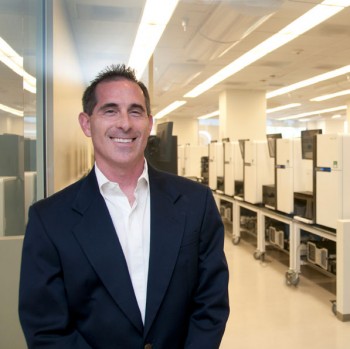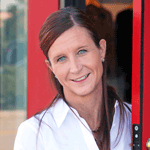
Running a customer service team is always a challenge, but imagine doing so for a company that provides complex, cutting-edge gene-analysis technologies for the world’s leading academic, government, pharmaceutical, and biotech groups. That’s what Kirk Malloy does as senior vice president and general manager of the life sciences business unit for Illumina, a San Diego-based company that makes instruments, software, and reagents used to isolate, analyze, and sequence genes. Illumina’s yearly revenues top $1 billion, and have grown at 19 percent compound annual growth rate from 2008 to 2012.
By its very nature, Illumina changes and evolves quickly, and its customer service division must match every step. Founded in 1998, the company started with a focus on genotyping products and services—used for analyzing a small subset of a full genome—before expanding through acquisitions to offer personal and full genome sequencing. Malloy, who holds a PhD in marine biology and biochemistry, started in the customer service field by taking a tech support job at a biotech company. His blended experience in research labs and support centers is an asset at a company like Illumina. “I’ve had to work with commercial fishermen, professors, chemists, geologists—lots of people with different educational and social backgrounds,” he explains. When Malloy joined Illumina in 2002, the company had virtually no products or revenues. He has relied on his eclectic background to develop a responsive team that now includes more than 450 people in 50 countries.
At its core, Illumina is an innovation and tech company that develops solutions to understand the relationships between the genome and the human condition. Its products and services have applications ranging from making better crops to understanding, diagnosing, or treating disease. “We create products that enable scientists to leverage information in the genome to improve our lives,” Malloy says.
Illumina’s service team has a carefully chosen name. “We named the group ‘customer solutions’ because we are very involved in aspects as a safety net for our customers,” Malloy says. “We don’t complain about problems, we solve them.” His team works on product development, launches, upgrades, and transitions to make sure customer concerns are addressed.
A new product transfer group sits in on product development to give the customer a voice and to make sure products are usable and serviceable. “Development engineers and scientists would constantly reinvent and improve the technology through field upgrades and new releases, but there wasn’t always someone there to ensure the transitions went smoothly for customers and support staff; now, we have that component,” says Malloy, adding that the specialized department provides a continuous customer voice to each new product and service.
From the minute a customer decides to buy an Illumina product or service, he interacts with the customer solutions team, through which representatives manage orders; make shipment notifications; and provide on-site training, installation, maintenance, upgrades, and 18-hour support in more than a dozen languages. Illumina increases its user base by more than 30 percent every year, and often launches major new platforms every one to two years with frequent functionality expansions to hardware, software, and chemistry. “Our new products sometimes render old ones obsolete as we develop more sophisticated technology capable of generating unprecedented amounts of data,” Malloy says.
Additionally, Illumina’s customer base is diversifying as the genomic revolution enters the mainstream. Malloy can’t simply hire people that know science and then train them to understand business. He must provide specialized technicians who understand how an IVF clinic or a cancer lab might use Illumina products in different ways because any of those clients could call one of his three regional contact centers for support at any time.
To respond, Malloy is building a computer telephony integration call center in which customers are automatically directed to support scientists and engineers who are certified in certain technologies and certain markets that use them. Field engineers and field scientists are assigned discreet geographical territories, but can also cover a wider area, serving as a virtual matrix of specialists to support the diverse needs of different customer types. All of the customer contacts are carefully logged in the global CRM system, with key metrics being leveraged at the management level to ensure the proper trainings and incentives are driving the right behaviors and customer
experience.
A company called LogicNets is helping Illumina provide fast and efficient troubleshooting tools for support staff and customers. The software and solutions company builds decision engines (branded MyAnswers at Illumina) that take the user through service questions using an online flowchart process from symptom to root cause to solution, including rich content such as documents, videos, pictures, and other resources. “We train people on troubleshooting, but each person still takes a different human approach in the field. These engines help us find one standard way of attacking problems,” Malloy says.
Illumina’s machines can generate an astonishing amount of DNA sequence data in just a few days. Since the computer storage space required can rival the cost of generating the sequencing data, the company has developed a cloud-computing environment called BaseSpace through which users can archive, access, analyze, and share sequencing data with little or no expense and no IT infrastructure. The database also enables the company to be proactively alerted when problems occur in the field, and to view and analyze customer data to assist them with interpretation and troubleshooting without having to travel or mail hard disks. That capability allows Malloy’s division to diagnose issues quickly and discover emerging patterns. The tool has already helped the customer solutions team identify and replace a damaged shipment before any customers reported the issue.
After 15 years, Illumina is still a relatively young company and is looking forward to new developments. Full and personal genome sequencing is now a reality, and while the cost of the first human genome sequence in 2001 was more than $2 billion, Illumina technology now prices that same sequence at well under $10,000—the cost of just a few routine medical tests.
Soon, Illumina predicts, every newborn will receive full DNA mapping at birth. The information will go into a medical record and help physicians provide better care—a potential game changer in preventative medicine. And as Illumina continues to provide increasingly innovative products and services, the customer solutions team will be there every step of the way.

